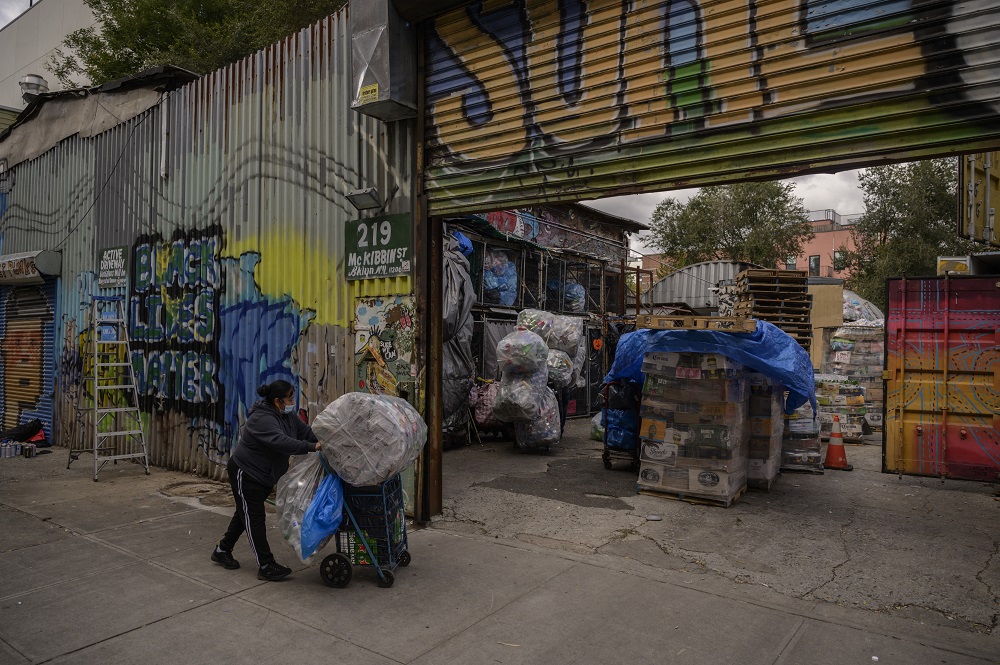NEW YORK, Nov 1 — On a Brooklyn street, Laurentino Marin doesn’t stop to admire the Halloween decorations. Like every morning, the Mexican is busy filling a shopping cart with used cans and plastic bottles, which he will exchange for a few dollars.
Marin, who is 80, is one of New York’s estimated 10,000 “canners,” mostly older migrants from Latin America and China who scrape a living sorting and recycling plastics and aluminum.
Frail and stooped over, Marin stops in front of the stairs of a typical brownstone house that dots this neighbourhood, lifts the lids of the trash cans and plunges his gloved hands into them.
He also searches through plastic packaging filled with garbage that sit on the sidewalk, awaiting collection from the city’s sanitation department.
Large see-through bags hang from his trolley, already full to the brim with a multicoloured assortment of soda and beer cans.
“I’m looking for cans to survive,” the wrinkled-faced Marin, originally from Oaxaca, says in Spanish.
“I don’t receive help, there is no work, so you have to fight,” he adds.
Marin does not have an employer. He exchanges his cans and bottles in one of the city’s private recycling centres. For each one he gets a five-cent coin.
On an average day, he makes between US$30 and US$40 (between RM124.37 and RM165.83), enough to supplement his daughter’s income from a laundromat so they can make their US$1,800 monthly rent.
The five-cent sum was enshrined in a 1982 New York state law known as the “Bottle Bill” that was passed to encourage consumers to recycle. It hasn’t changed in almost 40 years.
“It had a really good impact of reducing litter across the state, especially in New York City,” said Judith Enck, founder of the anti-pollution movement, Beyond Plastics, which campaigned at the time for the law.
Enck now wants to see the amount doubled to ten cents.
“We didn’t realise that this would become a major source of income for many families, as it has,” she told AFP.
The state government says the bill facilitated the recycling of 5.5 billion pieces of plastic, glass and aluminum containers throughout New York in 2020 alone, more than half the 8.6 billion items sold.
The canners are a key part of that effort but they are unofficial workers, lacking the benefits and health insurance that would come with a recognised job.
They symbolise New York’s massive wealth inequality, which Eric Adams, all but certain to be elected the city’s next mayor Tuesday, has pledged to address.
“It’s hard. There are people who walk for miles and miles,” explains Josefa Marin, also Mexican.
Pandemic woes
“And then there are places where people don’t like to have their waste collected. They throw us away like little animals and don’t understand that we make a living out of it,” she adds.
A derogatory term also exists for them: scavengers, which the canners say fails to recognise their contribution to the environment.
“We are helping to keep the city clean,” says 52-year-old Marin.
“(Without us) all this plastic would go into the sewers and the sea. We are doing something for our planet, for our ecology,” she adds.
Marin regularly takes her collection to Sure We Can, a non-profit recycling centre in Brooklyn, which also serves as a community space where canners can come together.
Director Ryan Castalia says the centre attracts a diverse crowd.
“We have candidates here who are experiencing homelessness, and who really need every cent that they get here,” he explains between mountains of sorted cans and bottles.
“And we have candidates here who are almost like small business entrepreneurs who really use canning to support their whole families or their livelihoods. They’ll process thousands of cans every day.”
Spring of 2020 was particularly difficult for the canners when the pandemic closed New York City’s bars and restaurants.
But with other jobs drying up, the years-old industry keeps attracting new workers and in turn increasing competition.
“I am in construction,” says Alvaro, a 60-year-old Mexican. “It pays much better but there is no work, so for a year I have been collecting my cans.”
“It doesn’t bring in much. There are too many people on the streets.” — AFP






















